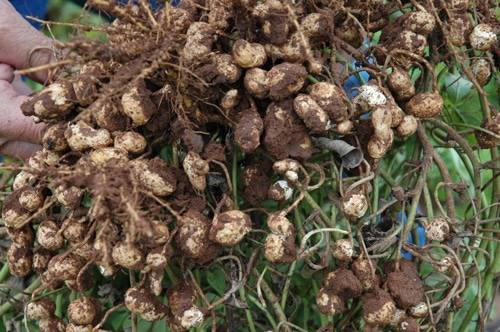
Eastern New Mexico and West Texas account for an annual production of 123 million pounds of peanuts, an estimated value of $37 million. In this region, efficient peanut production relies upon the crop's ability to yield under decreased water availability and oftentimes, critical heat stress. Two field days will help farmers in both states improve efficiency.
August 31, 2010

New Mexico State University is teaming up with area researchers and universities to bring Cooperative Extension Service agents, agricultural professionals, shellers, roasters and processors the latest information about peanut production through two field days. The first field day is Sept. 8 in Brownfield, Texas. Another field day will be held Sept. 15 in Portales, N.M.
"The major constraints to peanut production on the Southern High Plains are drought, variations in temperature and the high incidence of pod rot complex diseases," said Naveen Puppala, a peanut breeder at New Mexico State University's Agricultural Science Center at Clovis. "Drought is a primary concern and the effects of heat and drought stress on peanut flavor are dramatically evident in arid regions of the U.S."
To maintain the region's monopoly for the production of specialty peanuts, it is necessary that growers have the peanut cultivars that mature early, produce more with less water, are resistant to fungal infection and maintain good seed quality.
At the Sept. 8 field day, participants will get to see on-farm research trials where experts will share year-to-year yield data and can also address problems producers face at digging, disease updates and how plants respond to deficit irrigation.
NMSU is working with Texas A&M and Texas Tech, along with the United States Department of Agriculture-Agricultural Research Service labs and Cropping System Research Lab, in Lubbock, Texas, and the National Peanut Research Lab in Dawson, Ga., to bring the latest information about the different peanut varieties.
During the tours, Puppala will discuss the response of peanut varieties to digging dates.
Leonard Lauriault, forage agronomist at the Agricultural Science Center at Tucumcari, will talk about peanut forage yield and its nutritive value.
Tracey Carrillo, assistant director of the Agricultural Experiment Station, will provide information about seed certification.
Other presentations at the field day will include topics such as: peanut varieties, pod rot and late season leaf spot management, stress-tolerance evaluations, remote sensing of peanuts and fertility management.
The field day on Sept. 15, in Portales, will concentrate on organic peanut production, since this is an area that is growing in New Mexico.
"Favorable weather, less rainfall and humidity make this region an ideal environment for organic production in this part of the country, and generally there is more demand for organic peanut production, but there is always short supply," Puppala said.
At the Portales field day, Brandon Smythe, an NMSU graduate student, will discuss screening of the Valencia core collection for resistance to Sclerotinia, a plant pathogenic fungus.
John Idowu, an Extension agronomist, will talk about soil fertility management in peanuts grown with manure compost. Kulbushan Grover, assistant professor in the Department of Plant and Environmental Sciences, will offer information about the growth and yield of peanuts in compost-amended soil. Puppala will discuss breeding for disease-resistant varieties for organic peanut production.
The Sept. 8 field day is at the Delwin Marrow Barn, FM 403 South, in Brownfield, Texas. Registration and a free dinner start at 5 p.m. and the field tours begin at 6 p.m.
The Sept. 15 field day is from 9 to10 a.m. and will take place at the Eastern New Mexico University farm, a half-mile west of the university on the South Floyd highway, immediately adjacent to the La Casa Family Health Care Center.
You May Also Like



